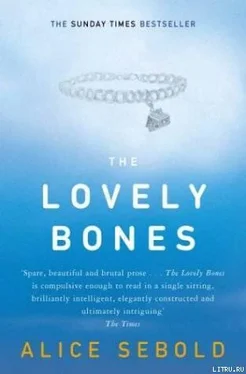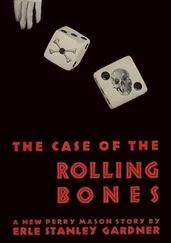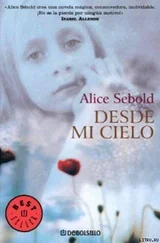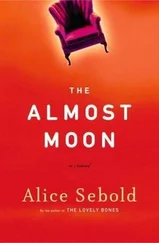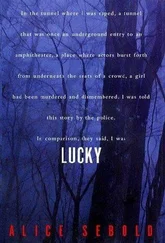“Like snowflakes,” Franny said, “none of them the same and yet each one, from where we stand, exactly like the one before.”
When she returned to junior high in the fall of 1974, Lindsey was not only the sister of the murdered girl but the child of a “crackpot,” “nutcase,” “looney-tunes,” and the latter hurt her more because it wasn’t true.
The rumors Lindsey and Samuel heard in the first weeks of the school year wove in and out of the rows of student lockers like the most persistent of snakes. Now the swirl had grown to include Brian Nelson and Clarissa who, thankfully, had both entered the high school that year. At Fairfax Brian and Clarissa clung to each other, exploiting what had happened to them, using my father’s debasement as a varnish of cool they could coat themselves with by retelling throughout the school what had happened that night in the cornfield.
Ray and Ruth walked by on the inside of the glass wall that looked out on the outdoor lounge. On the false boulders where the supposed bad kids sat, they would see Brian holding court. His walk that year went from anxious scarecrow to masculine strut. Clarissa, giggly with both fear and lust, had unlocked her privates and slept with Brian. However haphazardly, everyone I’d known was growing up.
Buckley entered kindergarten that year and immediately arrived home with a crush on his teacher, Miss Koekle. She held his hand so gently whenever she had to lead him to the bathroom or help explain an assignment that her force was irresistible. In one way he profited – she would often sneak him an extra cookie or a softer sit-upon – but in another he was held aloft and apart from his fellow kindergartners. By my death he was made different among the one group – children – in which he might have been anonymous.
Samuel would walk Lindsey home and then go down the main road and thumb his way to Hal’s bike shop. He counted on buddies of his brother’s to recognize him, and he reached his destination in various pasted-together bikes and trucks that Hal would fine-tune for the driver when they pulled up.
He did not go inside our house for a while. No one but family did. By October my father was just beginning to get up and around. His doctors had told him that his right leg would always be stiff, but if he stretched and stayed limber it wouldn’t present too much of an obstacle. “No running bases, but everything else,” the surgeon said the morning after his surgery, when my father woke to find Lindsey beside him and my mother standing by the window staring out at the parking lot.
Buckley went right from basking in the shine of Miss Koekle home to burrow in the empty cave of my father’s heart. He asked ceaseless questions about the “fake knee,” and my father warmed to him.
“The knee came from outer space,” my father would say. “They brought pieces of the moon back and carved them up and now they use them for things like this.”
“Wow,” Buckley would say, grinning. “When can Nate see?”
“Soon, Buck, soon,” my father said. But his smile grew weak.
When Buckley took these conversations and brought them to our mother – “Daddy’s knee is made out of moonbone,” he would tell her, or “Miss Koekle said my colors were really good” – she would nod her head. She had become aware of what she did. She cut carrots and celery into edible lengths. She washed out thermoses and lunchboxes, and when Lindsey decided she was too old for a lunchbox, my mother caught herself actually happy when she found wax-lined bags that would keep her daughter’s lunch from seeping through and staining her clothes. Which she washed. Which she folded. Which she ironed when necessary and which she straightened on hangers. Which she picked up from the floor or retrieved from the car or untangled from the wet towel left on the bed that she made every morning, tucking the corners in, and fluffing the pillows, and propping up stuffed animals, and opening the blinds to let the light in.
In the moments when Buckley sought her out, she often made a barter of it. She would focus on him for a few minutes, and then she would allow herself to drift away from her house and home and think of Len.
By November, my father had mastered what he called an “adroit hobble,” and when Buckley egged him on he would do a contorted skip that, as long as it made his son laugh, didn’t make him think of how odd and desperate he might look to an outsider or to my mother. Everyone save Buckley knew what was coming: the first anniversary.
Buckley and my father spent the crisp fall afternoons out in the fenced-in yard with Holiday. My father would sit in the old iron lawn chair with his leg stretched out in front of him and propped up slightly on an ostentatious boot scraper that Grandma Lynn had found in a curio shop in Maryland.
Buckley threw the squeaky cow toy while Holiday ran to get it. My father took pleasure in the agile body of his five-year-old son and Buckley’s peals of delight when Holiday knocked him over and nudged him with his nose or licked his face with his long pink tongue. But he couldn’t rid himself of one thought: this too – this perfect boy – could be taken from him.
It had been a combination of things, his injury not the least among them, that had made him stay inside the house on an extended sick leave from his firm. His boss acted differently around him now, and so did his coworkers. They trod gently outside his office and would stop a few feet from his desk as if, should they be too relaxed in his presence, what had happened to him would happen to them – as if having a dead child were contagious. No one knew how he continued to do what he did, while simultaneously they wanted him to shut all signs of his grief away, place it in a file somewhere and tuck it in a drawer that no one would be asked to open again. He called in regularly, and his boss just as easily agreed that he could take another week, another month if he had to, and he counted this as a blessing of always having been on time or willing to work late. But he stayed away from Mr. Harvey and tried to curb even the thought of him. He would not use his name except in his notebook, which he kept hidden in his study, where it was surprisingly easily agreed with my mother that she would no longer clean. He had apologized to me in his notebook. “I need to rest, honey. I need to understand how to go after this man. I hope you’ll understand.”
But he had set his return to work for December 2, right after Thanksgiving. He wanted to be back in the office by the anniversary of my disappearance. Functioning and catching up on work – in as public and distracting a place as he could think of. And away from my mother, if he was honest with himself.
How to swim back to her, how to reach her again. She was pulling and pulling away – all her energy was against the house, and all his energy was inside it. He settled on building back his strength and finding a strategy to pursue Mr. Harvey. Placing blame was easier than adding up the mounting figures of what he’d lost.
Grandma Lynn was due for Thanksgiving, and Lindsey had kept to a beautifying regime Grandma had set up for her through letters. She’d felt silly when she first put cucumbers on her eyes (to diminish puffiness), or oatmeal on her face (to cleanse the pores and absorb excess oils), or eggs yolks in her hair (to make it shine). Her use of groceries had even made my mother laugh, then wonder if she too should start to beautify. But that was only for a second, because she was thinking of Len, not because she was in love with him but because being with him was the fastest way she knew to forget.
Two weeks before Grandma Lynn’s arrival, Buckley and my father were out in the yard with Holiday. Buckley and Holiday were romping from one large pile of burnished oak leaves to another in an increasingly hyper game of tag. “Watch out, Buck,” my father said. “You’ll make Holiday nip.” And sure enough.
Читать дальше
